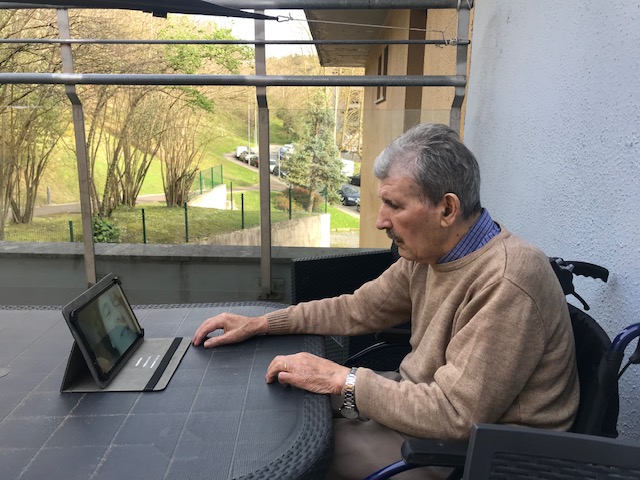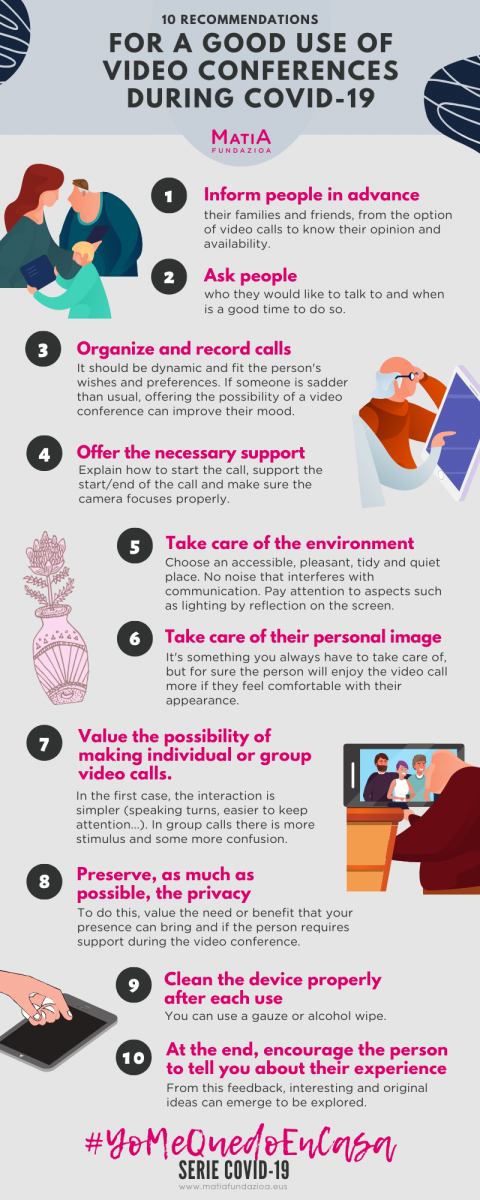
How to be close when we are far away: technology in times of confinement and the good life in everyday life.
Those of you who know our centres, or "houses" as we prefer to call them, know that we have a habit of having regular and close contact with families. Without visiting hours, people feel free to come in when it suits them best to enjoy the company of their family member, which favours that sensation of movement and activity typical of a living and warm space.
We always emphasize that even though we are the ones who assume the technical care, there is a part, that of the affection, that we cannot replace, nor do we intend to. That is why, from the moment the decision was taken to close the centre to the families, we understood that the information we had to offer would be the same, always honest and transparent.
We knew that, at a time like the present, a call would not be enough, and that there is nothing like seeing the other person to offer peace of mind. That's why we decided to jump into the pool with this theme of video calls, until a few months ago unexplored territory for us.
After some initial thought and testing we decided to use tablets with a sim card, which would allow us to make video calls through an application familiar to most of us, such as WhatsApp. Once the protocol to be followed for these virtual meetings was defined, we advised the families and residents about the possibility of using this new channel of contact with their loved ones, so that they could make the decision to use it or not.
Some people, for different reasons, have declined the offer, but in general, the vast majority have shown interest and agreement with the idea.
If someone asks us what has brought this new communication system to our homes we could summarize it in one word: "peace of mind". In the face of the relentless bombardment of news related to the pandemic and residences, families are eager to receive information about what is happening inside each home. This system gives them a window, opens a crack through which to break through this invisible wall that has built the blissful covid. It is an elixir for that uncertainty, which, at this moment, is no small thing.
For the residents it has also proved to be a great novelty. If people are well at a cognitive level we try to respect their privacy, leaving the room until the communication ends or they call us for any other reason.

We observe all kinds of reactions, some people approach the tablet to give a kiss, others touch the screen... There are those who are not able to recognize their relative, but it doesn't matter, the feeling is still positive. With some support from us, even those with great impairment communicate (verbal and non-verbal communication) to the best of their ability.
The case of Jose Mari comes to mind. He has been living with us for four years, and a few weeks ago he made the first video call of his life. To his cousin. Jose Mari found it hard to hide his astonishment at seeing his relative on the screen. It was hard for him to believe, let alone understand. After several sessions, we are now surprised to see how quickly and naturally he has incorporated this new way of keeping in touch with the outside world into his routine.
And what can we say about Joaquina, how happy she is to see her farm and her animals on the screen; Josefa, whose granddaughter Naiara encourages her by playing some pieces on the piano; or Gabriela, 98 years old, who transmits her concern for a friend of hers from another residence. It was to see her and be much more peaceful.
On the other hand, among the advantages that we are discovering with the passing of the days is the possibility of receiving from the families photographs and videos for their loved ones. Thanks to the tablets we can teach them these contents and in a way, they remain in direct contact with their families and stimulate different cognitive areas.
We usually make one video call per week for each resident, but we are open to extend it if they request it or if it coincides with some important event (birthday, etc.). In addition, for everyone's enjoyment, we alternate the family member who receives the video call or we make group video calls, with more than one family member or friends. This way, people who live with us can see and talk to all their loved ones.
For those of us who work these days, it's turned out to be an energy boost. It is the feeling that you can do something good, something that brings us closer and helps us to reassure all those families who are worried about our situation. Yes, "our", their families and those of us who are with them. Every time it is possible for them to take an interest in us, they thank us for our work and recognize us as good professionals.
We believe that in these strange times we should not leave aside the perspective of the family, understand what they are going through and how hard it is not to be able to be close to yours.
As a result of our experience and hoping that it may be of help to others who are living similar situations, we have collected a series of guidelines that may guide you on this new path which, due to the good reception it is receiving, seems to be here to stay.
Recommendations for a good use of video conferences during CoVid-19
- Inform people in advance their families and friends, from the option of video calls to know their opinion and availability.
- Ask people who they would like to talk to and when is a good time to do so.
- Organize and record calls. It should be dynamic and fit the person's wishes and preferences. If someone is sadder than usual, offering the possibility of a video conference can improve their mood.
- Offer the necessary support. Explain how to start the call, support the start/end of the call and make sure the camera focuses properly.
- Take care of the environment. Choose an accessible, pleasant, tidy and quiet place. No noise that interferes with communication. Pay attention to aspects such as lighting by reflection on the screen.
- Take care of their personal image. It's something you always have to take care of, but for sure the person will enjoy the video call more if they feel comfortable with their appearance.
- Value the possibility of making individual or group video calls. In the first case, the interaction is simpler (speaking turns, easier to keep attention...). In group calls there is more stimulus and some more confusion.
- Preserve, as much as possible, the privacy. To do this, value the need or benefit that your presence can bring and if the person requires support during the video conference.
- Clean the device properly after each use. You can use a gauze or alcohol wipe.
- At the end, encourage the person to tell you about their experience. From this feedback, interesting and original ideas can emerge to be explored.


Add new comment